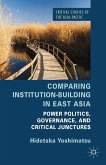Tastes differ importantly between generations, or birth cohorts. Consumption habits formed in youth are maintained throughout later life. Part I demonstrates how to measure cohort effects as distinct from age effects on food consumption; predicts future consumption as population changes in age, and consequently cohort structure. Korean children overtook those in Japan in height in the early 2000s. Per capita GDP and consumption of animal products in Japan was appreciably greater than in Korea. Korean children were also taller than those in Taiwan in recent periods, although Korea's per capita meat consumption has been considerably below Taiwan's. A century ago, young men in Taiwan were a few cm taller than their Korean peers. Genetics fails to explain these differences. Per capita vegetable consumption in Korea has been twice as much as both in Japan and Taiwan while the newer cohorts in Japan have steered away from fruit and vegetables since the mid-1980s, which may deserve scientific attention.
Bitte wählen Sie Ihr Anliegen aus.
Rechnungen
Retourenschein anfordern
Bestellstatus
Storno








